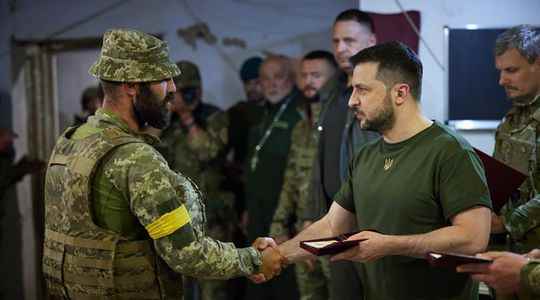Faced with the risk of “fatigue” in Western countries, British Prime Minister Boris Johnson called on his allies not to weaken in the effort, at the risk of seeing Vladimir Putin fulfill his objectives. Gathered since this Sunday in the Bavarian Alps, the leaders of the G7 intend to keep up the pace, while Ukraine undergoes the advance of Russian troops in the Donbass. Present by videoconference on Monday, Volodymyr Zelensky will try to obtain new weapons and additional financial assistance.
- Zelensky will ask Westerners for new arms deliveries
While he is due to speak this Monday by videoconference on the occasion of the G7 in Munich, the Ukrainian President, Volodymyr Zelensky, should take the opportunity to demand more weapons from the West, in order to be able to resist the progression Russian in the Donbass. “The G7 leaders have sufficient joint potential to stop Russian aggression,” he said. “But that will only be possible when we get everything we ask for and in the time needed: the weapons, the financial support, punishments against Russia”. On this last point, the United States and the United Kingdom have announced an embargo on imports of Russian gold. A ban on newly mined gold in Russia supposed, in the words of Boris Johnson , “hit the Russian oligarchs and attack Putin’s war machine”.
Faced with the risk of “fatigue” of the Western camp mentioned by Boris Johnson, the American president launched a new call for the unity of the G7 and NATO against Moscow. “Vladimir Putin was hoping that somehow NATO and the G7 would split. But we didn’t and we won’t,” Biden said. Host of the summit, German Chancellor Olaf Scholz also praised the unity of the allies, which “Putin did not expect”. And to relax the atmosphere, the leaders did not hesitate, during an informal exchange captured by the cameras, to make fun of the Russian president and his shirtless pose during a photo session in 2009.
- Kyiv hit by missiles at G7 summit
While Russian troops are almost exclusively concentrated in the Donbass region, explosions were reported in the kyiv region on Sunday, the day of the opening of the summit of the G7 countries in the Bavarian Alps. Four missiles hit a central district of the capital, killing at least one person and injuring six, according to the mayor of kyiv, who evokes an “attempt to intimidate Russia” while two international meetings are linked in a few days great importance: the G7 and the NATO summit. “A 7-year-old Ukrainian child was sleeping peacefully in kyiv until a Russian cruise missile blew up her building,” said the Ukrainian foreign minister.
For his part, Joe Biden considered that these bombings were “barbaric”. Russia denies the accusations and says it only hit a missile production plant.
- The Russian army advances in the Donbass and threatens elsewhere
Russian forces completely seized the strategic city of Severodonetsk, 90% destroyed, and entered the neighboring city of Lysytchansk, an important step towards the conquest of the entire Donbass mining basin. “However, this is only one of the challenges that Russia will have to meet to occupy the whole of the region”, estimates the British Ministry of Defence, which underlines the Russian will “to advance on the major center of Kramatorsk and to secure the supply routes” of the city of Donetsk. The Russian Defense Ministry also said it struck three military training centers in the north and west of the country.
In addition, the American Institute for the Study of War observes “abnormal series of Russian strikes on rear areas”. He cites the command of the Ukrainian Air Force according to which some 50 strikes were recorded this Saturday near kyiv, Khmelnytskyi and Lviv in the East, in Cherniguiv in the North, in Mykolaiv in the South, in Kharkiv in the North- East and in the Dnepropetrovsk region, in the center of the country. Russia thereby recalls its ability to reach any point on Ukrainian territory, even if most of the operations take place in the East and South. This Saturday, Vladimir Putin announced his intention to deliver “in the coming months” to Belarus, a country bordering Ukraine, an ally of Russia, missiles capable of carrying nuclear warheads.
